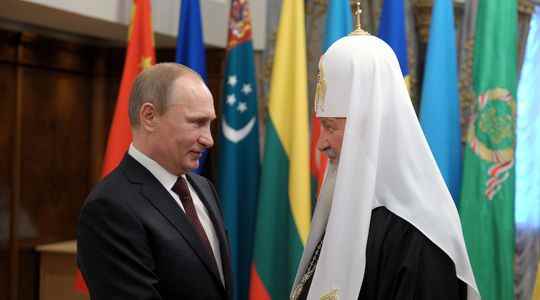His name is Vladimir, he was a spy for the KGB and leads a very luxurious lifestyle. But unlike the other, he wears a thick white beard and wears a koukoulion, the headgear of Orthodox monks, a symbol of spirituality and charity. Since 2009, Vladimir Goundiaïev has been, under the name of Kirill, the sixteenth patriarch of Moscow and all the Russias, the highest existing function within the Orthodox Church of the country, but also the most exposed to pressure from the Kremlin, when we know that Vladimir Putin’s grand design is precisely to unite “all the Russias”.
An ambitious man with an irresistible rise…
Born in 1946 in Leningrad, the current Saint Petersburg, Vladimir Goundiaïev is the grandson of an Orthodox priest victim of the Stalinist purges. This did not prevent him, from an early age, from wanting to pursue a career within a Church entirely subject to Soviet power. Ordained a monk at the age of 23, he worked in the service of religious diplomacy, first in Geneva, as a representative of the Ecumenical Council of Churches, then in Moscow, as head of the department of external relations. During his Swiss period, he developed a love for skiing and luxury watches, as evidenced by a photograph taken in 2012 where we can see the reflection of his 30,000 euro watch on a table, and a photomontage had tried to camouflage. But above all at this time he became a KGB intelligence agent, which created, for the specialist in post-Soviet Russia Galia Ackerman, “a strong and very long-standing collusion between him and Putin.”
The one whose code name is “Mikhailov” was successively ordained priest in 1970, bishop in 1976, archbishop in 1988 and metropolitan in 1991. ‘Orthodox Church on the sale of tobacco, hence its nickname of Metropolitan of Tobacco”, explains Antoine Nivière, professor of cultural and religious history of Russia at the University of Lorraine. Its network extends, its ambition grows and its capacity interests, in particular Vladimir Putin, elected in 2000 president of the Russian Federation.
Considering the disappearance of the USSR as “the greatest geopolitical catastrophe of the 20th century”, Putin wishes to maintain the spiritual union of the Russian peoples, in the absence of being able to unite them geographically. For this, he strives to maintain excellent relations with the Orthodox Church, in the hope of soon dictating his vision to it, as his master, Stalin, did in the past. “In Russia, there is an old tradition of submission of the Orthodox Church to political power”, says Antoine Nivière. “And if, officially, it is now independent, the current facts of followership prove the contrary”, he adds. So when in 2012 Putin heard Patriarch Kirill, who had been in office for three years, call him a “miracle of God”, he knew he now had a relay capable of spiritually justifying his future actions.
… Became a benefactor of the worst abuses
Combining convictions and a sense of duty, Kirill began to publicly denounce the ideological drift of the West, “morally decadent” and driven by the desire to “destroy Russian society”. The word of the Kremlin is golden and each military project is dubbed by the patriarch. “He does not hesitate to bless the tanks which leave for the war in Ukraine, whereas it is by conviction or by necessity, he is complicit in the actions of the regime”, notes Galia Ackerman.
When Russia supports dictator Bashar-el-Assad, Kirill goes to Syria. When the Wagner group deploys its influence in the Central African Republic, it announces a partnership between the Orthodox Church and African parishes… Putin’s entire ideological lineage is justified in the sermons, in the name of the survival of greater Russia. “The Russian Orthodox Church presents itself as a defender of the interests of the nation, and in the case of the war in Ukraine, it goes so far as to deny a fraternal bond”, observes Antoine Nivière. Thus, this intervention is described as a “holy war”, “an act of heroic resistance against forces wishing to destroy the historical unity between kyiv and Moscow.” And if the word of the patriarch should not be confused with dogma, “all discordant voices are silenced”, indicates Galia Ackerman.
Deaf to the appeal made to him by Pope Francis, inviting him to become “a peacemaker”, and to the open letter signed at the beginning of March by more than 280 Russian Orthodox priests expressing their opposition to the war, Kirill seen the representatives of his Church in Ukraine let him go, much to Putin’s anger. “Ten years ago, Kirill promised Putin that Ukraine would religiously remain hand in hand with Russia. ceased to insist on having an independent Church of Moscow”, points out Antoine Nivière.
First patriarch of Moscow to meet a pope from Rome – it was in 2016 – Kirill could become the first religious leader targeted by international sanctions, and thus pay dearly for History for having become, as qualified Pope Francis, “Putin’s altar boy”.
